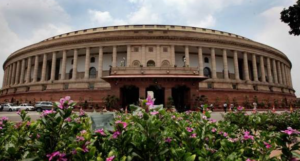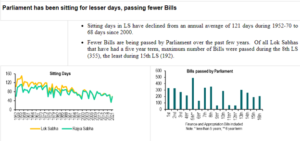Elegant Symphony of Democracy.
Managing Conflict, Cherishing Diversity, Nurturing Oneness
GS 2: Parliament and State Legislatures—Structure, Functioning, Conduct of Business, Powers & Privileges and Issues Arising out of these.
Tags: #Parliament #Democracy #GS2 #IndianExpressEditorialAnalysis #IndianExpress
Why in the News?
In the dynamic landscape of the 21st century, the Parliament of India continues to serve as the cornerstone of the country’s democratic framework. As a platform for deliberation, accountability, and legislative action, it remains a vital institution driving India’s socio-economic progress and ensuring the preservation of democratic values.
Parliamentary Supremacy and Democratic Mandate
- Parliaments symbolize the collective will of sovereign citizens. MPs in constitutional democracies must seek constituent support through elections.
- Formed via popular will have authority to enact laws, allocate resources, and set political goals.
- It gives voice to ordinary citizens, reflecting their concerns and needs.
- Parliaments hold the executive branch responsible for its actions. People are the core of parliamentary democracy, driving its functioning.
India’s Status as “Mother of Democracy”
India is recognized for being the origin or foundation of democratic principles.
Historical and Cultural Legacy:
- India’s claim is based on its rich historical and cultural heritage spanning thousands of years.
- Ancient texts from various regions of India refer to institutions and structures that enabled discussions and debates.
- These texts also highlight the existence of participatory governance, notably at the village community level.
- Tribal areas in India have showcased instances of robust local self-governance, displaying resilience.
- These historical aspects collectively contribute to India’s reputation as the “mother of democracy.”
Persistence through Political Upheavals
Despite significant political changes, Indian citizens have steadfastly upheld their democratic values.
- Deep-rooted Democratic Ethos: The democratic principles are deeply ingrained in the collective mindset of the people. The success and growth of parliamentary democracy in post-independence India stand as a testament to the commitment to democratic ideals.
- Honoring Forefathers’ Efforts: The preservation of democratic ethos showcases the dedication of earlier generations in safeguarding these values.
- Seamless Integration with History: The current Indian Parliament aligns naturally with a historical continuum spanning centuries, further highlighting its significance.
- Continuation of Legacy: The Parliament is a rightful heir to the distinguished democratic heritage, signifying its role as a worthy torchbearer of the past.
Founding Fathers’ Faith in Democracy
- Many foreign experts raised grave concerns about the longevity of the democratic experiment, which they saw as an alien plant on the political soil of India, after India gained independence in 1947.
- Our founding fathers, who were well-versed in our history, tradition, and culture and who had a great confidence in the political sense and common sense of our people, did not, however, have such hesitancy or self-doubt.
- At the onset of our independence, India adopted a Constitution that was incredibly progressive, and the path over the subsequent seven decades has confirmed that faith in the people of India and their ability to make the correct decision when it meant the most.
Role of Robust Parliamentary System
- Conflict Management – In order to keep us unified and strong and to lead the country ever onward on the path of progress and prosperity for the last person in line, our strong, accommodating parliamentary system has helped the country handle disagreements, cherish diversity, and promote oneness of spirit.
- Inclusive Approach – The Indian Parliament, which is directed by the Constitution, has allowed for and respected diversity in all of its forms while treating everyone equally and never hesitating to reach out to the socially vulnerable groups.
Parliament’s Function as a Source of Transformative Law
- Indian Parliament is like final watchdog of the Public exchequer.
- It decides how money should be used, keeps an eye on how it’s spent, and ensures the government uses money responsibly.
- Since Parliament is made up of people elected by citizens, it’s responsible for making sure the government is doing its job properly.
- Through various instruments available to it in the Constitution, the Rules of Procedure and Conduct of Business, tradition and well-settled precedents.
Parliament as Voice for the People
- Parliament draws the nation’s and the governments’ attention to problems, challenges, and difficulties of People
- Through Progressive legislation and discussions on topics of current national interest, the Indian Parliament has played a determined and purposeful role in bringing about positive socio-economic change in a society as diverse as India.
- These efforts have gone a long way toward educating the public about the nuances and varied dimensions of the issues at hand.
- Since independence, our parliament has passed more than 4,000 laws, 216 of which were passed by the Houses in the 17th Lok Sabha.
- India is now recognized as a country that supports the rule of law because to these pieces of legislation.
- Additionally, it demonstrates that India is a country that is committed to enhancing the standard of living of its residents and creating an inclusive and just society.
Parliamentary Committees: Extending Parliament’s Reach
- They are referred to as miniature parliaments.
- These committees are given significant authority and responsibility to conduct in-depth reviews of bills, budgetary proposals, programs, and policies, as well as the operations of several Union government ministries.
- The work of committees greatly enhances and supports that of parliament because of their greater operational flexibility.
- They are able to create their own methods, get evidence from government authorities, and directly ask for opinions from individuals, groups, and professionals.
- These review processes contribute to more thorough parliamentary investigation and supervision of government agencies.
Parliamentary Privileges: Balancing Rights and Responsibilities
- The Constitution gives members of the Houses of Parliament specific rights, privileges, and immunities, both individually and collectively, to enable them to carry out their duties effectively, without fear or favor.
- Parliamentary privileges defend and protect the independence, legitimacy, and dignity of Parliament from encroachment by other state bodies.
- In order to allow members to openly voice their opinions, this is essential.
- These rights include protection from arrest in civil cases while the legislature is in session or during committee meetings, as well as immunity from prosecution for statements made in the Houses of Parliament.
- Members must be aware of the obligations that go along with their rights in order to prevent the use of these privileges for frivolous, unjustified, and defamatory claims.
Maintaining Parliamentary Decorum and Responsibility
- Upholding Ethical Conduct: In order to uphold the highest parliamentary standards, members of parliament are morally and ethically required to talk in the House in a responsible manner.
- Disappointment in Parliamentary Proceedings: Unfortunately, there have been times throughout the years when the way the Parliament has run has let down those who turn to the Houses for real deliberation and debate on local, national, and global matters.
- Erosion of Deliberative Environment: Unfortunately, in recent years, the frequency of members’ occasional interruptions of meetings and displays of disorderly behavior has increased.
Balancing Dissent and Responsibility in Parliamentary Proceedings
- Constructive Expression Over Disruption: While the right to dissent and ask questions is essential to democracy and must be safeguarded at all costs, this right should not be used as a reason to cause disorder and disturbance in the House when discontent may be more effectively expressed through intelligent discussion, irony, and humor.
- Consequences of Disruptive Behavior: The overall effect of disruptive obstructionist behavior is lower House productivity, the passage of significant legislation without in-depth debates, the waste of the chance to demand detailed answers from the government and the raising of issues specific to parliamentary constituencies during Zero Hour.
- Shared Responsibility for Restoration: In order to restore the primacy of Parliament among the state’s organs, citizens should seriously consider how to do so. Parliament is a responsible body that is uniquely qualified to find solutions to the most difficult issues facing the country through informed, systematic, and open deliberation.
Amrit Kaal’s Parliamentary reforms
- It is up to us, the people of India, to figure out how to make this supreme representative institution deserving of the respect and confidence that voters have placed in their elected representatives as we approach the Amrit Kaal of our existence as a sovereign nation.
- Upholding the honor and dignity of Parliament is a duty that members of parliament owe to the people of this great country.
- Parliamentarians should always act with dignity and decorum, with a feeling of responsibility, purpose, and dedication because they serve as role models for the public.
Harnessing Technology for India’s 21st Century Transformation
- The Amrit Kaal of India and the twenty-first century are the eras of revolutionary technologies. We’ve used technology to solve issues that in the not-too-distant past seemed impossible.
- As a means of bringing about greater equality, access, openness, awareness, and services, it has grown to be an essential and inalienable part of our daily lives.
- Integral Role of Technology: Our Parliament needs to fully embrace technology and set the example.
- In order to improve communication with its members, other legislative bodies, and the general public, the Indian Parliament has made concerted efforts over the past few years to integrate information technology into the operation of both the Parliament and its secretariat.
- To reduce carbon footprint and increase efficiency, the new Parliament building has adopted cutting-edge green building standards.
- For the purpose of providing members and stakeholders with better service, the Digital Sansad app has been created and is continually improved.
- To further engage the younger generation, social media coverage of Parliament’s events and historical documents is being improved.
- A true “e-Sansad” is being developed by the Indian Parliament.
Parliament: Living Expression of India’s Collective Will
- It is important to recognize that the Indian Parliament is a vibrant representation of the wishes of more than a billion people.
- The Constitution, the laws of the land, and the moral authority provided by the people of India all strengthen the authority of parliamentarians in their commitment, both individually and collectively, to advancing the welfare of residents.
- Over the course of its seventy years of existence, the Indian Parliament has been successful in creating an appealing melody of democracy, rising above the occasional inconsistent note.
- Its liberal spirit has treated all viewpoints equally while persistently upholding constitutional principles, national interest, unity of the country, and the general good.
As the country experiences profound transformation during Amrit Kaal, it is our responsibility as the present residents of this holy space to preserve this glorious history. Let the Indian Parliament continue to be a symbol of peace and hope for all communities and countries that desire to offer a parliamentary arena where the collective will of the people can be expressed.
Source: Indian Express
https://epaper.indianexpress.com/3756268/Delhi/September-01-2023#page/13
https://prsindia.org/parliamenttrack/vital-stats
Mains Question
Critically assess the role of parliamentary decorum and responsible conduct in maintaining the integrity of legislative proceedings. How does the increase in unruly behavior impact the credibility of the parliamentary institution and the public’s trust in the democratic process?





